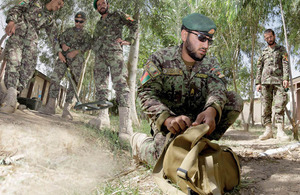Afghan Army step up in the fight against IEDs
Afghan National Army warriors are taking the lead role in the battle against improvised explosive devices (IEDs). Report by Richard Long.

Afghan warriors have actively embraced the challenge to create their very own counter-IED capability [Picture: Graeme Main, Crown Copyright/MOD 2012]
The Taliban’s weapon of choice throughout the campaign in Helmand province has been the improvised explosive device. Claiming scores of lives and responsible for countless injuries, the lethal bombs have been the scourge of UK Armed Forces personnel.
While British forces have developed an impressive arsenal of vehicles, kit and ground techniques to counter this threat, the roadside risk could pose a significant problem for the Afghan National Army (ANA) as they move towards transition in 2014.
With ISAF troops withdrawing from the country, it is the homegrown forces that will be charged with rendering these devices safe in as little as 18 months’ time.
But instead of shirking the responsibility, Afghan warriors have actively embraced the challenge to create their very own counter-IED capability.
Recruits learn the tricks of the trade during a 22-week training programme in Mazar-e Sharif before polishing their skills in a validation package staged at Camp Shorabak under the watchful eye of UK soldiers from the Brigade Advisory Group.
Sergeant Major Baz Mohammed has served for three years with the ANA and is now taking a starring role within this growing asset:
The lessons from the British Army have really helped us,” he said.
We have covered all kinds of IEDs and they have taught us everything we need.
I am now performing this role within the ANA. We have finished our lessons and we can deal with the threat. We are very confident and happy with the skills we have.
I want to continue and become an instructor in the future. It is very important for our country that we take the lead.
The training in Mazar-e Sharif was completely different from what we are doing here. The British troops are reminding us that we can solve the problems ourselves.
During a confirmation exercise, the skill and attention to detail Sergeant Major Mohammed displayed mirrored that of the experts within ISAF’s ranks.
Warrant Officer Class 2 Moxy James, Royal Logistic Corps, part of the validation course team, believes the Afghans are well placed to assume full responsibility for this crucial work and revealed the operatives have taken a lead role on tasks in the field:
We go out with them, not to do the job but to act as a comfort blanket. We are trying to move away from that now and the hope is they will go on the next engagement without us.
One of these guys did three tasks before he was validated and he was fine. They are trained to international standards and are out there doing an excellent job.
Another dealt with eight devices and a 120kg main charge. He is still alive so it shows they know what they are doing.
While the job brings these soldiers face-to-face with deadly IEDs, it also comes with a host of secondary dangers:
A lot of these guys come from places like Kabul. When they do this course they become targets for the insurgents, so they risk a lot,” WO2 James explained.
But when the training is complete they get posted to places far removed from where they live.
They are keen to do the job and do it for themselves. There are four British military operators in Mazar-e Sharif doing the teaching so they are doing it exactly like we would.
The validation course is about making sure they are up to speed, informing them about what is happening and ensuring they are happy.
The role has encouraged a change in mentality to ensure IED tasks are approached in the right manner.
WO2 James said:
Their culture is not to question someone in authority. If they are told to blow a device they will do it.
But if these guys go down to an IED and they do not like what they see, they will come back and work out a plan to deal with it.
They are always thinking, and now have the confidence to do something about it.
And while progress is clear in terms of the front line, plans are already being made to create a lasting legacy for the Afghan counter-IED force:
There is a process in place where the guys coming through this school will be trained as instructors,” the senior non-commissioned officer said.
They will then filter out and we can step out of the frame.
If we see individuals who are good at instructing they will be pushed forward so we can start to build.
The IED side is very important in terms of transition. It is the main weapon the Taliban use against us, and it is the main weapon they will use against the Afghan National Army.
It has to be successful and they need to have the skills. I am confident that will be the case.
This article is taken from the July 2012 edition of Soldier - magazine of the British Army.